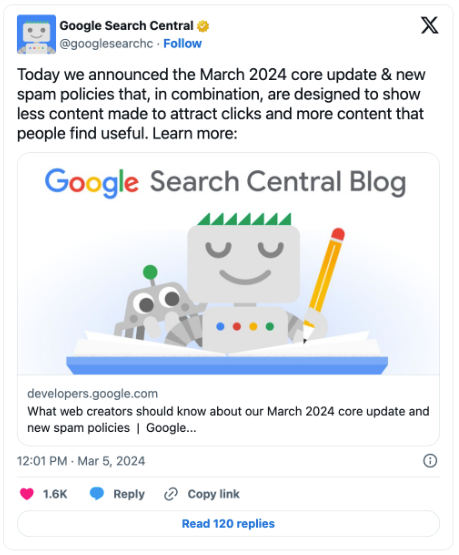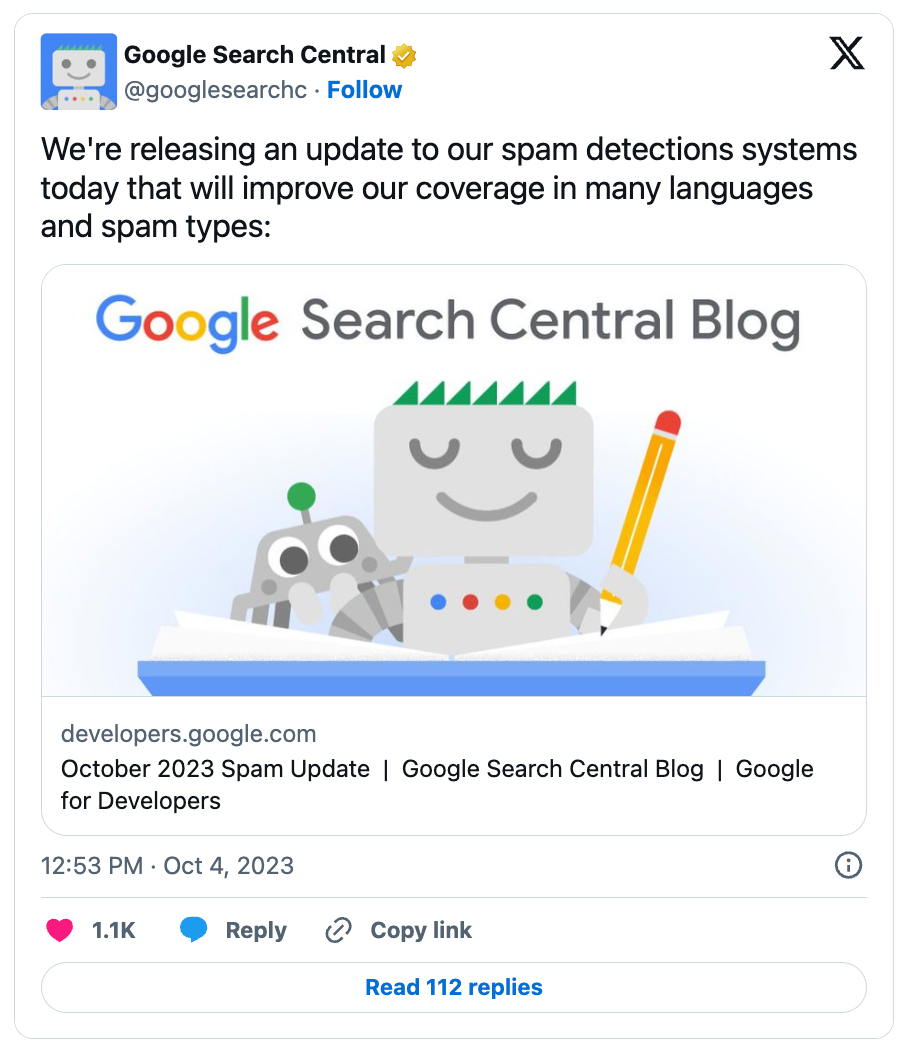The Gist
- Leaked documents. More than 14,000 lines of Google’s search algorithm code goes public online.
- SEO disruption. Google’s March 2024 Core Update saw considerable volatility and stirred the SEO community.
- Spam overhaul. Google continues to fight spam with updates targeting scaled content, site reputation and more.
Editor’s Note: This article was updated on July 1, 2024 to include new data and information.
This year has already seen some major waves in the SEO world. From a complex core algorithm update to thousands of lines of leaked code, we’re all learning what to do — and what not to do — to get our pages ranking on Google SERPs.
As website owners and digital marketers scramble to adapt, understanding these updates becomes crucial to maintaining visibility. Dive in as we dissect the latest news and algorithmic shifts that might change the game for online content.
June 2024: Google Kills Infinite Scroll
Google released word that it will kill its infinite scroll feature on desktop search results, opting instead for a “More Results” button that appears at the bottom of the page. The search giant also plans to remove the feature from mobile search results within the next month.
According to Google, this change is meant to serve search results faster, instead of automatically loading search results that users haven’t explicitly requested. Plus, Google told Search Engine Land, loading more results automatically didn’t lead to significantly higher satisfaction for users.
This decision to move away from infinite scroll reflects a broader trend of reassessing user interface designs that prioritize ease of navigation and clarity — particularly in environments where information overload is a concern.
For website owners and SEO strategists, this could mean adjustments in how we evaluate page performance and user engagement, as user interactions within search results may change.
June 2024 Google Algorithm Leak
Perhaps some of the biggest news this summer is Google’s algorithm leak — more than 2,500 pages and 14,000 lines of code detailing Google’s search ranking mechanisms. The algorithm was accidentally made public via internal API documentation on GitHub.
While Google quickly made moves to take the information down, it was too late. Third-party services indexed the data, making it available to anyone who wished to view it well after it was removed from GitHub.
Some of the biggest takeaways from the leak for SEO experts?
- Domain and site authority are factored into rankings, despite Google saying otherwise
- Google analyzes the quality of backlinks and assigns values to them
- E-E-A-T is a significant ranking factor for content, especially YMYL content
- It’s important to create a unique title for each page on your site and include your target keyword early and naturally
- Short-form content can still rank well, especially if it’s original
- Publish dates matter more than many SEOs thought, with Google trying to serve up the freshest content available
Related Article: 10 Actionable Insights From the Google Algorithm Leak
June 2024 Spam Update
Google released a general and broad spam update, which completed rollout on June 27. According to Google, while its automated systems to detect spam are in constant operation, they occasionally release updates such as this one to make improvements to how they work. One such system that may have been impacted in this update is SpamBrain, Google’s AI-based spam prevention system.
According to Google, sites that noticed a change after the rollout of this update should review the company’s spam policies to ensure they are in compliance. Sites that violate these policies could rank lower in search results or not rank at all.
March 2024 Core Update & Spam Updates
March 2024 saw Google’s first core update of the year, one that was more complex than usual, as it involved changes to multiple systems. With this update, Google claimed it would no longer rely on one single signal or system to show more helpful search results.

According to Google officials, they expect this update, along with previous efforts, to reduce low-quality unoriginal content in search engine results pages by 40%.
The search giant also continues its fight against spam. It’s AI-based spam prevention system, SpamBrain, identified nearly six times more spam sites in 2021 compared to 2020. In an effort to combat this growing problem, Google updated its spam policies in March to better address new and evolving abuse practices.
These updated spam policies centered around:
- Scaled content abuse: Abuse behavior around content generated at scale, whether with automation, humans or a combination.
- Site reputation abuse: Low-value third-party content produced primarily for ranking purposes.
- Expired domain abuse: The purchase and repurposing of expired domains to boost low-quality, unoriginal content.
What Happened to SEO in 2023?
Google’s November 2023 Core Update
The November 2023 core update is a significant algorithm change, marking the second such update within a two-month span and the fourth core algorithm update of the year. This update began rollout on November 2 and is expected to be fully implemented after a two-week period.
This core update targets improvements to a different core ranking system than the one adjusted in the October 2023 core updates. While it’s typically uncommon for two major updates to happen in such a short timeframe, Google generally suggests that site owners who focus on creating helpful, reliable and user-first content will likely not need to make significant changes in response.
Along with this update, Google also posted a revised Q&A on Google Search updates, which provides more guidance on the difference between a ranking system and an update, why Google rolls out updates, what steps site owners should take amidst updates and more. Those who still need help or want to follow volatility reports following an update can visit Google’s Search Central Help Community forum.
View all
Google’s October 2023 Core Update
The October 2023 core update, the third core update of the year, started rollout on October 5 and completed October 19.
Barry Schwartz of Search Engine Roundtable commented on the significant volatility caused by this core update. “I cannot say enough how big of an impact this update had within the SEO community and probably wider,” he wrote.
Core updates are broad changes to Google’s search algorithms and systems that can significantly impact how web pages rank, but there’s nothing within these updates that targets specific pages or sites.
The overall goal of core updates, according to Google, is to ensure they’re delivering on their mission to present helpful and reliable results for searchers. They likened it to creating a list of the top 100 movies in 2021. A few years later, you refresh the list, and you might add movies that didn’t exist three years ago, or reassess some films and realize they deserve a different spot.
Related Article: What’s New in Search? Top SEO Strategies
Google’s October 2023 Spam Update
Overlapping with the October 2023 core update was Google’s new spam update, which began rollout on October 4 and ended October 20. Google’s tweet on the subject said the update to their spam detectors will “improve our coverage in many languages and spam types.”

This update applies globally and improves coverage in Turkish, Vietnamese, Indonesian, Hindi, Chinese and other languages. Common types of spam that Google targets include:
- Cloaking: Presenting different content to users vs. search engines, with the intent of manipulating SERPs and misleading users.
- Doorways: Sites or pages created to rank for specific, similar search queries. They lead users to intermediate pages that aren’t as helpful as the final destination.
- Scraped content: Content taken from other, more reputable sites that doesn’t provide any additional value to users.
- Spammy auto-generated content: Content generated programmatically without adding anything original or offering sufficient value.
- Hidden text and links: Content placed on a page designed to manipulate search engines that’s not easily viewable by human users.
- Keyword stuffing: Filling a webpage with keywords in an attempt to manipulate the SERPs.
Google said companies that noticed an impact from this update should review its spam policies to make sure they’re in compliance.
Google’s September 2023 Helpful Content Update
Google’s September 2023 Helpful Content Update, which finished rollout on September 28, was not a core update, but still targeted content designed to rank well in search engines, specifically AI-generated content, or low-quality and unhelpful content.
This update promotes helpful content, but soon will also demote unhelpful content. It’s global, targeting all languages and, according to Barry Schwartz, Google said this update will be felt more for online educational materials, entertainment, shopping and tech-related content.
Danny Sullivan, Google’s Public Liaison for Search, added in a Tweet, “In addition to making it easier to find authentic perspectives, we’re also improving how we rank results in Search overall, with greater focus on content with unique expertise and experience.”
Any content on sites determined to have high amounts of unhelpful content overall is less likely to perform well on search, according to Google. “For this reason, removing unhelpful content could help the rankings of your other content.”
Their guidelines on how to create helpful, people-first content includes questions to self-assess your site, such as:
- Does the content provide original information, reporting, research or analysis?
- Does the page title provide a descriptive, helpful summary of the content?
- Would you expect to see this content referenced by a printed magazine or book?
- Is the content mass produced and outsourced to a large number of creators?
Related Article: The AI and Content Marketing Paradox: Empowering and Threatening the Future
Google’s August 2023 Core Update
Google’s second major core update finished rolling out on September 7, with the overall goal of improving search results. The August 2023 Core Update targeted all content types in all regions in all languages. This update doesn’t penalize content, according to Google, but instead rewards great pages.
Some pages that saw a drop in performance might see a full recovery after the rollout is complete. However, recovery is not guaranteed. And, if you make improvements to your content, it’s performance might not recover until the next broad core update is released.
Google recommends that underperforming sites or pages focus on creating high-quality content. Content creators who want better results in SERPs would do well to follow the E-E-A-T roadmap:
- Experience: Does content demonstrate it was produced with some degree of experience?
- Expertise: Does the content creator have the necessary knowledge or skill for the topic?
- Authoritativeness: Is the website or content creator a known go-to source for the topic?
- Trust: Is there independent, reliable evidence that the website or content creator is considered trustworthy?
Navigating the Evolving SEO Landscape
Google updates its search algorithms constantly. And it’s important for marketers, content creators and SEO pros alike to keep up with these changes to secure and maintain their rankings in SERPs.
Keep in mind that it can be hard to pin down how and why performance fluctuates.Those constant changes Google makes to its search algorithms? They don’t tell the public about all of them, including smaller core updates. Still, despite these challenges, one thing remains clear: a commitment to producing high-quality, user-centric content is always the best compass for success in search engine optimization.




